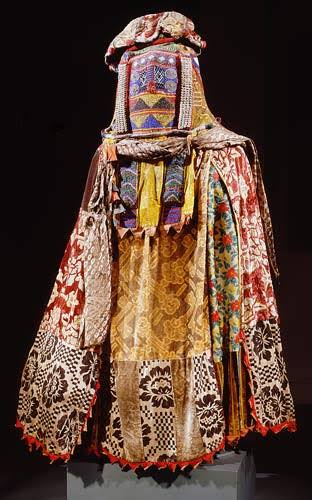Masquerade and masquerading are rooted in the culture and traditions of the different tribes in Nigeria and they are all different from each other in terms of functions and festivals. In Yoruba land, they are known to appear during festivals, rituals, ceremonies, or funerals.
Masquerades are a huge part of our tradition as it is passed down from one generation to another. In Nigeria, some families are known to be masqueraders. These masquerades are mostly youths in these families.
Masquerades are believed to have spiritual powers and the mask and clothes are seen as totem objects which shouldn’t be touched by an ordinary human being. There is also another belief that they represent the ancestors.
Here are some festive masquerades you’ll find in Yorubaland:
Egungun
“Egungun” is sometimes translated as “bone” or “skeleton”, but when pronounced with the correct tone, it means “masqueraders.” Otherwise known as masked ancestors of the Yoruba land, Egungun assures the people that the dead are among the living.
The Egungun is a secret society that listens to the requests of the living and carries their messages back to the ancestral community in heaven.
The responses of the Egungun can be fierce as well as generous because they expect their descendants to uphold the highest moral standards.
During the Egungun festival, which happens in June, the Egungun masquerade is dressed in colourful regalia with a whip that is used to flog anyone in the way of the spirits. Today, there is a thriving community of Egungun worshippers in Salvador da Bahia, Brazil, where they wear the colourful costumes of their Nigerian counterparts.
Eyo
The word “Eyo” also refers to the costumed dancers known as the masquerades that come out during the festival.
Back in the day, the Eyo festival was held to escort the soul of a departed Lagos King or Chief and to usher in a new king. The festival is also known as the AdamuOrisha Play and is presented by the people of Lagos as a tourist event.
The “Eyo” who represents the spirits of the dead are dressed in white apparels with a hat as well as hold a traditional iconic staff known as “Opambata.”
Legend says the Eyo came as a result of the need to protect a deity in the land from hooligans who wanted to cart it away.
Agemo
Agemo is a masquerade festival celebrated among the Ijebu people. The festival and accompanying rituals are celebrated to honour the spirit deity Agemo, who is believed to be a protector of children and who safeguards Ijebu’s future through its blessing.
The festival is mostly celebrated between June and August and historically coincided with the harvesting of maize by Ijebu farmers.
The festival is a week-long event marked with great festivities, traditional routines and an important feature which is the presence of the “Agemo” masquerades.
Alapansanpa Masquerade
The Alapansanpa, also known as EegunOgundeji, is one of the highly dreaded masquerades in Ibadan.
“Alapansanpa” masquerades are known for their visit to the Olubadan palace annually in the month of June, in and outside Ibadan, the Alapansanpa masquerade was used in the past to fight and win many wars. It is said that if Alapasanpadoesn’t go to the
Olubadan’s Palace, there will be no peace and prosperity in the land and it also means that the Olubadan is an evil person.
Atipako Masquerade
Atipakois known as a ‘load-carrying’ masquerade that is usually accompanied by women. The ancestral rites are done by a community or family elder referred to as ‘Alaagba’.
Atipako masquerade always carries stones, mortar and pestle on his head which portrays its significance for blessing the masses and the land. It comes out annually in June and cleanses the community.

